Borrow a Book Club Kit for Indigenous History Month
To support our College community’s ongoing efforts toward indigenization and deepening our understanding of Indigenous perspectives and voices, the Library offers a growing collection of book club kits featuring works by Indigenous authors.
Originally launched during Indigenous History Month, this initiative has continued to expand. Each kit contains 10 copies of the selected book along with a print discussion guide that includes background information about the author, selected reviews, and discussion questions. Gather your colleagues or friends and engage in meaningful conversations around these powerful works.
A History of My Brief Body
by Billy Ray Belcourt
Billy-Ray Belcourt's debut memoir opens with a tender letter to his kokum and memories of his early life in the hamlet of Joussard, Alberta, and on the Driftpile First Nation. From there, it expands to encompass the big and broken world... around him, in all its complexity and contradictions: a legacy of colonial violence and the joy that flourishes in spite of it, first loves and first loves lost, sexual exploration and intimacy, and the act of writing as a survival instinct and a way to grieve. What emerges is not only a profound meditation on memory, gender, anger, shame, and ecstasy, but also the outline of a way forward. With startling honesty, and in a voice distinctly and assuredly his own, Belcourt situates his life experiences within a constellation of seminal queer texts, among which this book is sure to earn its place. -- Provided by publisher.
Seven Fallen Feathers
by Tanya Talaga
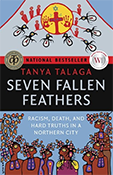
"From 2000 to 2011, seven indigenous high school students died in Thunder Bay, Ontario. The seven were hundreds of miles away from their families, forced to leave home because there was no high school on their reserves. Five were found dead in the rivers surrounding Lake... Superior, below a sacred indigenous site. Jordan Wabasse, a gentle boy and star hockey player disappeared into the -20° Celsius night. The body of celebrated artist Norval Morrisseau's grandson, Kyle, was pulled from a river, as was Curran Strang's. Robyn Harper died in her boarding-house hallway and Paul Panacheese inexplicably collapsed on his kitchen floor. Reggie Bushie's death finally prompted an inquest, seven years after the discovery of Jethro Anderson, the first boy whose body was found in the water. But it was the death of twelve-year-old Chanie Wenjack that foreshadowed the loss of the seven. Using a sweeping narrative focusing on the lives of the students, award-winning investigative journalist Tanya Talaga delves into the history of this small northern city that has come to manifest Canada's long struggle with human rights violations against indigenous communities." -- Provided by publisher.
21 Things You May Not Know About the Indian Act
by Bob Joseph
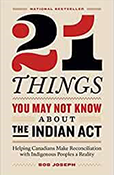
"This work is an essential guide to understanding the legal document and its repercussion on generations of First Nations, written by a leading cultural sensitivity trainer. Since its creation in 1876, the Indian Act has shaped, controlled, and constrained the lives... and opportunities of First Nations, and is at the root of many enduring stereotypes. In the first 105 pages the author writes with clarity about the history of this legislation that defines a First Nation person from birth to death. Using everyday language interspersed with humour he allows secondary level students as well as the general public access to a piece of legislation not many Canadians understand. The remainder of the book provides lists such as a chronology of residential school history, the Truth and Reconciliation Commission's Call to Action, and terminology. Also provided are selected classroom activities and discussion questions and selected quotes from John A. Macdonald and Duncan Campbell Scott." -- Provided by publisher.
The Strangers
by Katherena Vermette
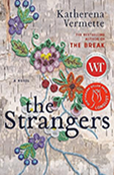 "A staggering intergenerational saga that explores how connected we are, even when we are no longer together - even when we're forced apart. Cedar has nearly forgotten what her family looks like. Phoenix has nearly forgotten what freedom feels like. And Elsie... has nearly given up hope. Nearly. As Cedar floats between foster homes, and eventually goes to live with her estranged father, she grapples with the pain of being separated from her mother, Elsie, and sister, Phoenix. From a youth detention centre, Phoenix gives birth to a baby she'll never get to raise, and finds herself trying to - or wondering if she even should - forgive herself for all the harm she's caused. Elsie, struggling with addiction and determined to turn her life around, is buoyed by the very idea of being reunited with her daughters and strives to be someone they can depend on, unlike her own distant mother, Margaret. These are the Strangers, each of them haunted in their own way by the death of Elsie's youngest daughter, Sparrow, a sweet, boisterous 8-year-old who died suddenly of pneumonia, leaving the family reeling from the weight of her loss. Between flickering moments of warmth and support, the women diverge and reconnect, fighting to survive in a fractured system that dares them to succeed, but expects them to fail. Facing the distinct blade of racism from those they trusted most, and a severe ignorance that surrounds them and confines their every move, they urge each other to move through the darkness, all the while wondering if they will ever emerge on the other side. A ... companion to her ... debut The Break, Vermette's The Strangers brings readers into the crushing and dynamic world of the Stranger family, the shared grief in their past, and the light that beckons from the horizon. This is a searing exploration of race, class, intergenerational trauma, and matrilineal bonds that - despite everything - refuse to be broken."-- Provided by publisher
"A staggering intergenerational saga that explores how connected we are, even when we are no longer together - even when we're forced apart. Cedar has nearly forgotten what her family looks like. Phoenix has nearly forgotten what freedom feels like. And Elsie... has nearly given up hope. Nearly. As Cedar floats between foster homes, and eventually goes to live with her estranged father, she grapples with the pain of being separated from her mother, Elsie, and sister, Phoenix. From a youth detention centre, Phoenix gives birth to a baby she'll never get to raise, and finds herself trying to - or wondering if she even should - forgive herself for all the harm she's caused. Elsie, struggling with addiction and determined to turn her life around, is buoyed by the very idea of being reunited with her daughters and strives to be someone they can depend on, unlike her own distant mother, Margaret. These are the Strangers, each of them haunted in their own way by the death of Elsie's youngest daughter, Sparrow, a sweet, boisterous 8-year-old who died suddenly of pneumonia, leaving the family reeling from the weight of her loss. Between flickering moments of warmth and support, the women diverge and reconnect, fighting to survive in a fractured system that dares them to succeed, but expects them to fail. Facing the distinct blade of racism from those they trusted most, and a severe ignorance that surrounds them and confines their every move, they urge each other to move through the darkness, all the while wondering if they will ever emerge on the other side. A ... companion to her ... debut The Break, Vermette's The Strangers brings readers into the crushing and dynamic world of the Stranger family, the shared grief in their past, and the light that beckons from the horizon. This is a searing exploration of race, class, intergenerational trauma, and matrilineal bonds that - despite everything - refuse to be broken."-- Provided by publisher
Learning That Matters
by Caralyn Zehnder

"Our society urgently needs education that motivates, challenges, engages, and affirms all students. No matter their previous successes or failures, every student has enormous learning potential and important contributions to make now and in the future. Such meaningful learning experiences don't just... happen they need to be intentionally designed. This book supports those who will undertake this vitally important work." -- Provided by publisher.
A Mind Spread Out on the Ground
by Alicia Elliott
In an urgent and visceral work that asks essential questions about Native people in North America while drawing on intimate details of her own life and experience with intergenerational trauma, Alicia Elliott offers indispensable insight and... understanding to the ongoing legacy of colonialism. What are the links between depression, colonialism and loss of language - both figurative and literal? How does white privilege operate in different contexts? How do we navigate the painful contours of mental illness in loved ones without turning them into their sickness? How does colonialism operate on the level of literary criticism? A Mind Spread Out on the Ground is Alicia Elliott's attempt to answer these questions and more. In the process, she engages with such wide-ranging topics as race, parenthood, sexuality, love, mental illness, poverty, sexual assault, gentrification, writing and representation. -- Provided by publisher.
Potlatch as Pedagogy
by Sara Florence Davidson and Robert Davidson
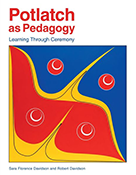
"In 1884, the Canadian government enacted a ban on the potlatch, the foundational ceremony of the Haida people. The tradition, which determined social structure, transmitted cultural knowledge, and redistributed wealth, was seen as... a cultural impediment to the government’s aim of assimilation. The tradition did not die, however; the knowledge of the ceremony was kept alive by the Elders through other events until the ban was lifted. In 1969, a potlatch was held. The occasion: the raising of a totem pole carved by Robert Davidson, the first the community had seen in close to 80 years. From then on, the community publicly reclaimed, from the Elders who remained to share it, the knowledge that has almost been lost. Sara Florence Davidson, Robert’s daughter, would become an educator. Over the course of her own education, she came to see how the traditions of the Haida practiced by her father--holistic, built on relationships, practical, and continuous--could be integrated into contemporary educational practices. From this realization came the roots for this book." -- Provided by publisher
A Digital Bundle
by Jennifer Wemigwans
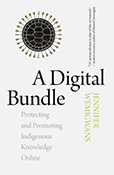 A Digital Bundle explores the potential of online and digital technologies to serve Indigenous resurgence by contributing to the goals of Indigenous nation building. Based on interviews and discussions with active users of Four Directions Teachings, a website created by Jennifer... Wemigwans, it makes a case for a new online social movement that embraces Indigenous perspectives. Key to this movement is the redefinition of online Indigenous knowledge projects as 'digital bundles,' thus elevating the cultural protocols and responsibilities that come with such a designation and grounding these projects within an Indigenous epistemological paradigm.--Provided by publisher.
A Digital Bundle explores the potential of online and digital technologies to serve Indigenous resurgence by contributing to the goals of Indigenous nation building. Based on interviews and discussions with active users of Four Directions Teachings, a website created by Jennifer... Wemigwans, it makes a case for a new online social movement that embraces Indigenous perspectives. Key to this movement is the redefinition of online Indigenous knowledge projects as 'digital bundles,' thus elevating the cultural protocols and responsibilities that come with such a designation and grounding these projects within an Indigenous epistemological paradigm.--Provided by publisher.
Rehearsals for Living
by Robyn Maynard and Leanna Betasamosake Simpson
 "A revolutionary collaboration about the world we're living in now, between two of our most important contemporary thinkers, writers and activists. When much of the world entered pandemic lockdown in spring 2020, Robyn Maynard, influential author of Policing... Black Lives, and Leanne Betasamosake Simpson, award-winning author of several books, including the recent novel Noopiming, began writing each other letters--a gesture sparked by friendship and solidarity, and by a desire for kinship and connection in a world shattering under the intersecting crises of pandemic, police killings, and climate catastrophe. Their letters soon grew into a powerful exchange on the subject of where we go from here. Rehearsals of living is a captivating book, part debate, part dialogue, part lively and detailed familial correspondence between two razor-sharp writers convening on what it means to get free as the world spins into some new orbit. In a genre-defying exchange, the authors collectively envision the possibilities for more liberatory futures during a historic year of Indigenous land defense, prison strikes, and global-Black-led rebellions against policing. By articulating to each other Black and Indigenous perspectives on our unprecedented here and now, and the long-disavowed histories of slavery and colonization that have brought us to this moment in the first place, Maynard and Simpson create something new: a vital demand for a different way forward, and a poetic call to dream up new ways of ordering earthly life." -- Provided by publisher.
"A revolutionary collaboration about the world we're living in now, between two of our most important contemporary thinkers, writers and activists. When much of the world entered pandemic lockdown in spring 2020, Robyn Maynard, influential author of Policing... Black Lives, and Leanne Betasamosake Simpson, award-winning author of several books, including the recent novel Noopiming, began writing each other letters--a gesture sparked by friendship and solidarity, and by a desire for kinship and connection in a world shattering under the intersecting crises of pandemic, police killings, and climate catastrophe. Their letters soon grew into a powerful exchange on the subject of where we go from here. Rehearsals of living is a captivating book, part debate, part dialogue, part lively and detailed familial correspondence between two razor-sharp writers convening on what it means to get free as the world spins into some new orbit. In a genre-defying exchange, the authors collectively envision the possibilities for more liberatory futures during a historic year of Indigenous land defense, prison strikes, and global-Black-led rebellions against policing. By articulating to each other Black and Indigenous perspectives on our unprecedented here and now, and the long-disavowed histories of slavery and colonization that have brought us to this moment in the first place, Maynard and Simpson create something new: a vital demand for a different way forward, and a poetic call to dream up new ways of ordering earthly life." -- Provided by publisher.
Wahi Wah!
by Jo Chrona
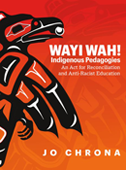
"How can Indigenous knowledge systems inform our teaching practices and enhance education? How do we create an education system that embodies an anti-racist approach and equity for all learners? This powerful and engaging resource is for non-Indigenous educators who want to learn more,... are new to these conversations, or want to deepen their learning." -- Provided by publisher.
Jonny Appleseed
by Joshua Whitehead
"Off the reserve and trying to find ways to live and love in the big city, Jonny becomes a cybersex worker who fetishizes himself in order to make a living. Self-ordained as an NDN glitter princess, Jonny has one week before he must return to the "rez" - and... his former life - to attend the funeral of his stepfather. The seven days that follow are like a fevered dream: stories of love, trauma, sex, kinship, ambition, and the heartbreaking recollection of his beloved kokum (grandmother). Jonny's life is a series of breakages, appendages, and linkages--and as he goes through the motions of preparing to return home, he learns how to put together the pieces of his life. Jonny Appleseed is a unique, shattering vision of First Nations life, full of grit, glitter, and dreams."
-- Provided by publisher.
Life in the City of Dirty Water
by Clayton Thomas-Müller
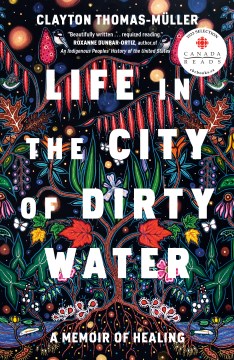
"A memoir that braids together the urgent issues of Indigenous rights and environmental policy, from a nationally and internationally recognized activist and survivor. There have been many Clayton Thomas-Müllers: The child who played with toy planes as an escape... from domestic and sexual abuse, enduring the intergenerational trauma of Canada's residential school system; the angry youngster who defended himself with fists and sharp wit against racism and violence, at school and on the streets of Winnipeg and small-town British Columbia; the tough teenager who, at 17, managed a drug house run by members of his family, and slipped in and out of juvie, operating in a world of violence and pain. But behind them all, there was another Clayton: the one who remained immersed in Cree spirituality, and who embraced the rituals and ways of thinking vital to his heritage; the one who reconnected with the land during summer visits to his great-grandparents' trapline in his home territory of Pukatawagan in northern Manitoba. And it's this version of Clayton that ultimately triumphed, finding healing by directly facing the trauma that he shares with Indigenous peoples around the world. Now a leading organizer and activist on the frontlines of environmental resistance, Clayton brings his warrior spirit to the fight against the ongoing assault on Indigenous peoples' lands by Big Oil. Tying together personal stories of survival that bring the realities of Canada's First Nations into sharp focus, and lessons learned from a career as a frontline activist committed to addressing environmental injustice at a global scale, Thomas-Müller offers a narrative and vision of healing and responsibility." -- Provided by publisher.
10 to 25: the science of motivating young people
by David Yeager
 Imagine a world in which Gen Xers, millennials, and boomers interact with young people in ways that leave them feeling inspired, enthusiastic, and ready to contribute-rather than disengaged, outraged, or overwhelmed. That world may be closer than you think. In this book... based on cutting edge research, psychologist David Yeager explains how to stop fearing young people's brains and hormones and start harnessing them." -- Provided by publisher.
Imagine a world in which Gen Xers, millennials, and boomers interact with young people in ways that leave them feeling inspired, enthusiastic, and ready to contribute-rather than disengaged, outraged, or overwhelmed. That world may be closer than you think. In this book... based on cutting edge research, psychologist David Yeager explains how to stop fearing young people's brains and hormones and start harnessing them." -- Provided by publisher.
Hood Feminism
by Mikki Kendall
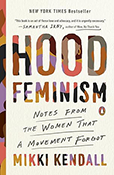 "In this collection of essays, Mikki Kendall takes aim at the legitimacy of the modern feminist movement arguing that it has chronically failed to address the needs of all but a few women. Drawing on her own experiences with hunger, violence, and hypersexualization, along with incisive... commentary on politics, pop culture, the stigma of mental health, and more, Hood Feminism delivers an irrefutable indictment of a movement in flux. An unforgettable debut, Kendall has written a ferocious clarion call to all would-be feminists to live out the true mandate of the movement in thought and in deed." -- Provided by publisher.
"In this collection of essays, Mikki Kendall takes aim at the legitimacy of the modern feminist movement arguing that it has chronically failed to address the needs of all but a few women. Drawing on her own experiences with hunger, violence, and hypersexualization, along with incisive... commentary on politics, pop culture, the stigma of mental health, and more, Hood Feminism delivers an irrefutable indictment of a movement in flux. An unforgettable debut, Kendall has written a ferocious clarion call to all would-be feminists to live out the true mandate of the movement in thought and in deed." -- Provided by publisher.
